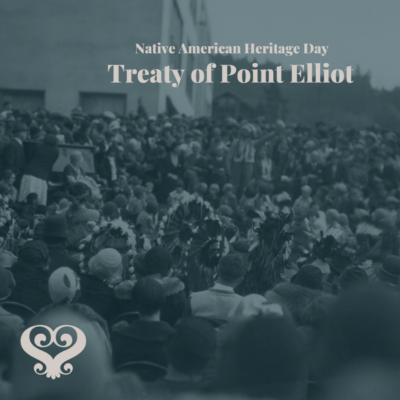The Salish Sea sends a gentle breeze that washes over the senses near the Rosehill Community Center. In the small seaside community of Mukilteo, 30 miles north of the City of Seattle, the Rosehill space comes equipped with a stage, fly tower, and sound system for a variety of events, including weddings. Couples enter a lottery to reserve the grand hall for their special day. Nearby is a stone marker planted into the landscaped plot, next to a set of stairs and a reflection bench.
168 years ago, a sea of thousands gathered at a site on the Salish Sea to witness the signing of a document. Most faces among the crowd would have been that of indigenous people from across the region. Four tribal chiefs would have been sitting in the front row. Standing nearby, white men dressed in the proper attire for dignitaries of that time. Despite communication barriers and deception, the Treaty of Point Elliott would be signed, impacting this land for generations to come.
Washington Governor Issac Stevens arrived with draft treaty in hand, designed to relegate indigenous communities into smaller reservations. In the end, tribes were forced to sign away control over much of their lives. In addition to ceding land, tribes also signed away independence from the federal government. The treaty established four reservations – Tulalip, Lummi, Swinomish, and Port Madison. Later the Muckleshoot reservation was added. The 54,000 acres of land taken included much of King County.
Over the decades that followed, tribes in the region have faced various forms of dislocation and violence. From broken treaties to the discrimination and ignorance that persists to this day, Native Americans in this region and many others in the United States are saddled with generations of collective trauma, often passed down on a cellular level. Understanding the roots of historical trauma impact our community and offer an important first step to healing.
Sankofa Impact believes that names have meaning. Consider Issac Stevens, the little man with a big ego that strong-armed the Treaty of Point Elliott. One way to correct the wrongs of history would be to reconsider Stevens County, Lake Stevens, Stevens Elementary, and Stevens Way, the very street that slices through the heart of the University of Washington.

